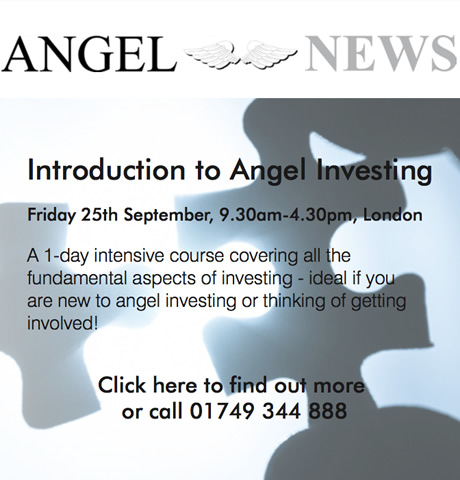Top 10 things you must think about before Easter
- The next stage in the evolution of crowdfunding is about to arrive with the announcement thatwww.allstreet.org is now publishing research on crowdfunding campaigns.
- The FinTech Revolution in the angel market has arrived with the use of platforms to manage deals - look at Envestors, Gust and Ruffena to see what we mean.
- Keep an eye out for new fundraisings for companies engaging in the internet of things - here might be a place tostart http://www.reply.eu/en/breed-reply/
- Will you be a leader or a follower when you invest in angel deals in the future? And if you are a leader do you really understand what it involves?
- The death of the solo angel investor is premature, although it is a brave man or woman who invests alone without very deep pockets.
- With the emergence of more formalised "angel" roles as a result of syndication, it is going to be more and more acceptable to be a working angel and to get paid for the work you do (even if it is in share options!)
- Is the end of the DCF as a valuation methodology in sight? In a world where inflation is at 0% and the risk free rate is 0, how on earth do we start to assess relative risk in terms of debt vs equity and early vs later stage investing? What does 17% IRR mean in this new world?
- If you have children/relatives about to leave school/university - remember the new cool is not to join the City, but to join a start-up. That's where you will learn the best business lessons and have the greatest chance of creating enough wealth to buy a house and pay school fees. So encourage them if they tell you that is the path they want to follow.
- Get ready for Big Data to start revealing the truth behind investment returns in the angel world - more news to follow on the 1st deep stats to be published from a leading angel group in April.
- It's the end of the tax year a week on Thursday so get investing to use up your VCT, EIS and SEIS allowances!
Due Diligence Isn't Important To Investors - Adrenalin and Imagination Are
There's no doubt excitement drives many new investors to put their money into an innovative enterprise. If there wasn't a thrill involved, they'd probably opt to park their cash somewhere safe such as a corporate bond fund. A bit of adrenalin helps people overcome their fear of the risk involved in investing in a start-up. The sort of companies platforms like ours deal in aren't cast iron guarantees, so some might say a little madness goes a long way in choosing these types of investment.
But after these heady feelings subside, there are the mundane concerns of how any investee company proposes to deliver on its plans for growth. This is the point at which the glint goes from many investors' eyes. Let's face it, due diligence is not a term to set the heart aflutter and get one's pulse racing. Plainly speaking, it's just not sexy.
We understand many individuals outside the financial services sector are somewhat baffled by graphs, tables and complex calculations. They recognise the savings available through EIS and SEIS tax relief, and are rightly excited by that. But, often, the detail of due diligence is a chore, a bore and, frankly, something they'd rather ignore. I'd argue that in some respects they're right. Or rather, I'd say they can afford to be a little cavalier as long as they're working with people who will carry out those checks and balances for them.
A big part of our business at CrowdBnk is occupied with the nuts and bolts of potential investments. We get just as excited as our investor clients about companies with the magic quality, an original concept, that certain something different. But, we're also very preoccupied with whether they already have customers, existing contracts or what revenue they're generating. Then, we test a firm's claimed valuation, any potential markets - its fundamental credibility. We grill the team behind the idea. Have they previously raised funds? We want hard evidence they can deliver on their promises.
That's our job. I think we do it well. When we present a business as being investment ready, we've really put it through its paces. We must give our investor community confidence in the enterprises on our platform. Then, they can decide which company excites them, fires their imaginations and start to indulge in those thoughts of what might be.
Investment in start-ups isn't a fevered dream. Any such reverie needs to sit on solid foundations. Our Bootcamp process of due diligence provides that reassurance.
Ayan Mitra is Chief Executive Officer at CrowdBnk, the London-based equity and debt crowdfunding investment platform.
Follow CrowdBnk on Twitter and like the Facebook page for more insights and to stay informed about the latest investment opportunities.
Building a Capital Markets Union ‐ the new sunny uplands of EU policy
Writing in the Financial Times on 9 March 2015 Wolfgang Munchau, the European economic columnist described how it will become very difficult for the German and Austrian Life industry, which sells insurance products and annuities with guaranteed returns, to remain solvent if they keep investing only in government and corporte bonds in a zero interest rate deflationary economy which is busily printing money. This is the slow moving train wreck which is more likely to lead to the next big financial crisis than worrying about a theoretical (though highly unlikely) exit of Greece from the Euro.
In anticipation of the difficulties ahead German insurers have apparently begun to diversify into other assets such as property or private equity.
And in February this year the European Commission published its green paper on 'Building a Capital Markets Union' in which Europe's priority is now seen as jobs and growth with the EU'S task being to link investors and savers with growth.
This is a long term project but one which is seen as being more pressing than ever and early progress is intended.
I cannot say whether there is a direct connection between the plight of Mitteleuropa's financial sector and the new rules being ushered in as regards financial promotion but this year's annual report from the EIB calls for financial market reform to encourage better provision of risk bearing finance for young innovative firms and other innovation activities, including through venture capital, high quality securitisation and greater use of credit guarantees.
These new initiatives should provide a number of opportunities for innovative EIS Fund Managers to raise significant amounts of additional capital; particularly if their EIS funds are structured in a way which responds to a traditionally conserviate approach to EU investing and which can also win the right to carry the new kite marks of EU assurance, in particular the kite marks of EuVECA and ELTIF status which are being developed.
In the next few months the Commission will:
- Develop proposals to encourage high quality securitisation and free up bank balance sheets to lend;
- Review the Prospectus Directive to make it easier for firms, particularly smaller ones, to raise funding and reach investors cross border;
- Start work on improving the availability of credit information on SMEs so that it is easier for investors to invest in them;
- Work with the industry to put in place a pan Eurppean private placement regime to encourage direct investment in smaller business; and
- Support the take up of new European long-term investment funds to channel investment in infrastructure and other long-term projects.
The rules governing financial promotion are about to change and from the new sunny uplands of EU policy the aim is to
'simplify the laws and reduce the red tape faced by managers of venture capital funds so they can easily raise capital across the whole of Europe and so better invest in European SMEs. Instead of having to comply with 27 national laws, they will be subject to a single and simplified regime. This will greatly facilitate their daily business while still ensuring that they are properly supervised."
Hoorah!!
Vistage Need Thought Leaders- Nationwide Opportunities
Vistage are the world's largest peer to peer mentoring organisation. If you've been a CEO/MD or a senior director and are passionate about developing others this is why the role of Vistage Group Chair could be for you:
- It provides a unique opportunity to make a real difference to your local business community.
- It's more stimulating than a non-exec role, and provides a regular, reliable income.
- We're not a franchise. You can work full-time or part-time but on average Chairs will allocate about 8 days per month
- We offer world-class and life changing Chair training, a range of Group launch and marketing support and a full back-office support infrastructure.
- You'll be joining the elite- a truly world-class community of over 800 Vistage Chairs world-wide.
If you're thinking about an executive portfolio career then Vistage could be for you. To find out more about our community and the role of a Vistage Group Chair you can register your details and download further information at vistage.co.uk/become-a-chair. Alternatively email [email protected] to arrange an initial discussion.
Add a comment:
Call us on 01749 344 888
or click here to contact us







